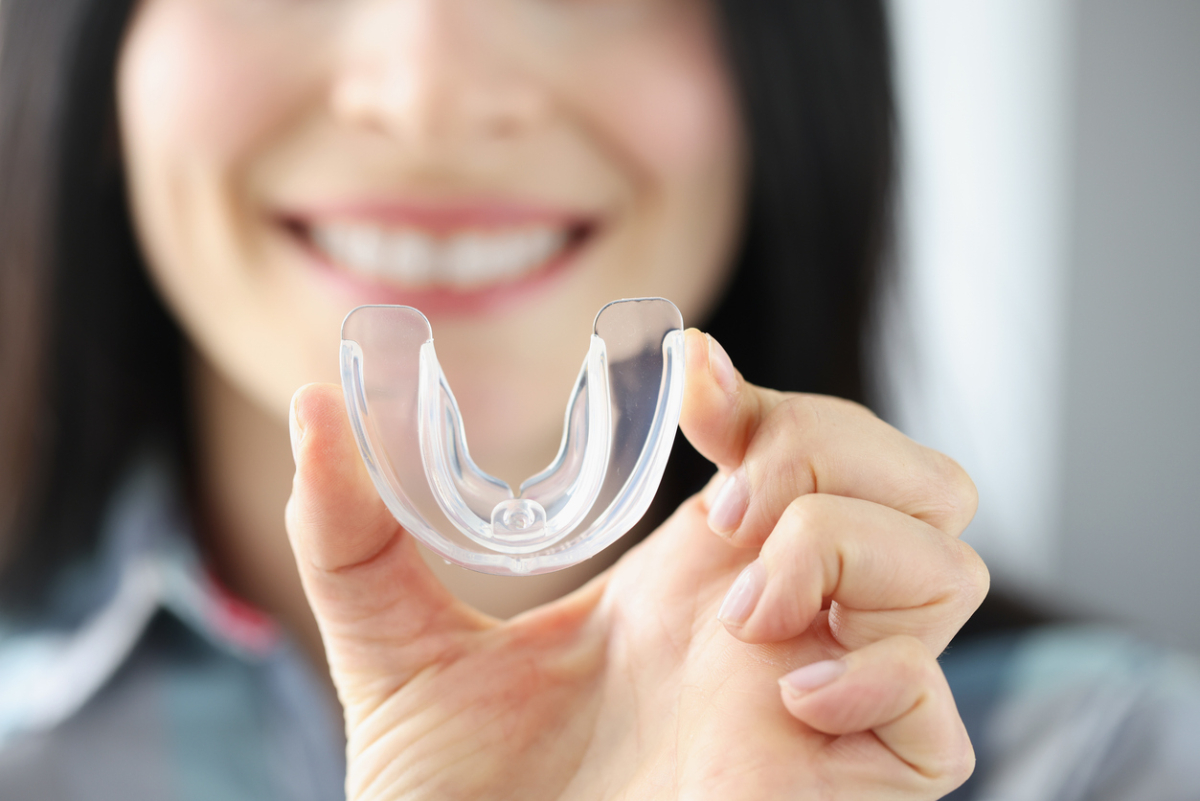Both mouthguards and night guards protect teeth from damage. But the common question is: What is the difference between a mouthguard and a night guard? In this article, we discuss the differences between these two appliances and the distinctions between custom-made and over-the-counter solutions.
What Is the Difference Between a Mouthguard and a Night Guard?
Often, the term “mouthguard” can be used to describe any appliance designed to protect your teeth from damage. However, let us examine the functions of both mouthguards and night guards to determine the difference more precisely.
Mouthguards
The primary purpose of a mouthguard is to protect your teeth and dental restorations from physical impact or trauma, such as broken teeth, cut lips, and jaw injuries. Mouthguards are mainly used when playing sports, especially extreme or contact ones, or engaging in other activities that pose a high risk of trauma.
Mouthguards are typically made of soft, thick plastic that can effectively absorb the shock from an impact. They typically cover the upper teeth.
Night Guards
A night guard is often recommended to people who have bruxism (involuntary teeth grinding and jaw clenching at night) or TMJ disorder. This appliance helps protect teeth from further damage and can relieve symptoms associated with these conditions.
Night guards are often made of harder or dual-layered materials for durability and bite protection, and are for one arch only (most commonly, the upper arch).
The symptoms that you might need a night guard due to bruxism or TMJ disorder include:
- Prematurely worn-out teeth and dental restorations (due to constant pressure and friction applied by grinding and clenching)
- Tension or soreness of the jaw, especially in the mornings
- Morning headaches
- The sound of teeth grinding at night (typically reported by a person who sleeps in the same room as you)
- Difficulty or pain when opening or closing the mouth
- Clicking, popping, or grinding sounds when opening or closing the mouth
- Neck and shoulder pain
- Tooth sensitivity to hot and cold foods and drinks, with no signs of tooth decay
- Earaches that are not caused by infection.
- Disturbed sleep (you can wake up multiple times a night due to bruxism)
Custom-made vs Over-the-Counter Mouthguards and Night Guards
Over-the-counter solutions are typically less expensive than custom-made ones. However, they have several disadvantages compared to custom-made options:
- Over-the-counter mouthguards and night guards are not as comfortable as custom-made ones, as they are made to fit everyone approximately. Even if you opt for a boil-and-bite option that can provide some customization, the fit will not be as precise as when your appliance is custom-made. Also, the fit of a custom-made mouthguard can be adjusted if it is not perfect.
- Over-the-counter mouthguards and night guards can feel too loose or too tight in the mouth, making it likely that you will unconsciously remove them or spit them out while asleep.
- Because over-the-counter mouthguards and night guards are not made with your individual anatomy in mind, they may not be as effective at absorbing the shock caused by an impact and protecting your teeth.
- Over-the-counter mouthguards and night guards are typically less durable than custom-made ones and tend to wear out much quicker, because they are made of lower-quality and softer plastic.
Get a Custom-Made Mouthguard at Dentistry Riverside
If you are experiencing any dental discomfort that may be solved with the help of mouthguards or nightguards, do not hesitate to schedule an appointment with an experienced dentist at our office today. At Cleopatra Dental Riverside, we offer our patients comfortable, custom-made, and reliable mouthguards and night guards that will protect your smile and boost your comfort. We look forward to your visit.
